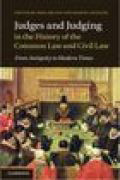
Judges and judging in the history of the common law and civil law: from antiquity to modern times
Brand, Paul
Getzler, Joshua
Leading historical research analysing the history of judges and judging, allowing comparisons between British, American, Commonwealth and Civil Law jurisdictions. This volume of essays by leading legal historians addresses the history of judges and judging, with comparisons not only between British, Americanand Commonwealth experience, but also with the judiciary in civil law countries. The essays derive from papers presented at the 18th British Legal History Conference. This volume of essays by leading legal historians addresses the history of judges and judging, with comparisons not only between British, American and Commonwealth experience, but also with the judiciary in civil law countries. The essays derive from papers presented at the 18th British Legal History Conference. In this collection of essays, leading legal historians address significant topics in the history of judges and judging, with comparisons not only between British, American and Commonwealth experience, but also with the judiciary in civil law countries. It is not the law itself, but the process of law-making in courts, that is the focus of inquiry. Contributors describe and analyse aspects of judicial activity, in the widest possible legal and social contexts, across two millennia. The essays cover English common law, continental customary law and ius commune, and aspects of the common law system in the British Empire. The volume is innovative in its approach to legal history. None of the essays offer straight doctrinal exegesis; none take refuge in old-fashioned judicial biography. The volume is a selection of the best papers from the 18th British Legal History Conference. INDICE: Part I. Common Law: 1. Judges and judging 1176–1307 Paul Brand; 2. Formalism and realism in fifteenth-century English law: bodies corporate and bodies natural David J. Seipp; 3. Early modern judges and the practice of precedent Ian Williams; 4. Bifurcation and the Bench: the influence of the jury on English conceptions of the judiciary John H. Langbein; 5. Sir William Scottand the law of marriage Rebecca Probert; 6. The politics of English law in the nineteenth century Michael Lobban; 7. Judges and the criminal law in England1808–1861 Phil Handler; 8. Bureaucratic adjudication: the internal appeals of the Inland Revenue Chantal Stebbings; Part II. Continental Law: 9. Remedy of prohibition against Roman judges in civil trials Ernest Metzger; 10. The spokesmen in medieval courts: the unknown leading judges of the customary law andmakers of the first continental law reports Dirk Heirbaut; 11. Superior courts in early modern France, England and the Holy Roman Empire Ulrike Muessig; 12. The Supreme Court of Holland and Zeeland judging cases in the early 18th century A. J. B. Sirks; Part III. Imperial Law: 13. 11,000 prisoners: habeas corpus, 1500–1800 Paul D. Halliday; 14. Some difficulties of colonial judging: the Bahamas 1886–1893 Martin J. Wiener; 15. Australia's early High Court, theFourth Commonwealth Attorney-General and the 'strike of 1905' Susan Priest; 16. Judges and judging in colonial New Zealand: where did native title fit in? David V. Williams.
- ISBN: 978-1-107-01897-6
- Editorial: Cambridge University
- Encuadernacion: Cartoné
- Páginas: 366
- Fecha Publicación: 12/01/2012
- Nº Volúmenes: 1
- Idioma: Inglés
